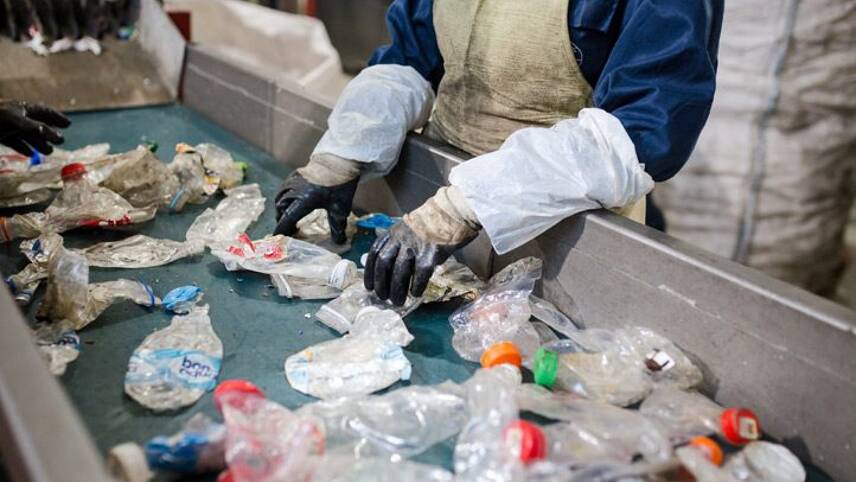Register for free and continue reading
Join our growing army of changemakers and get unlimited access to our premium content

AIM
In 2016, P&G’s sustainable packaging expert Gian deBelder helped develop and spearhead the HolyGrail collaboration in Europe, as part of the Ellen MacArthur Foundation’s New Plastics Economy.
The HolyGrail project, which aims to place digital watermarks on packaging, so they can be identified by a range of key stakeholders, won edie’s Circular Economy Innovation of the Year Award for 2020.
In developing the project, more than 30 companies across the plastics packaging value chain, including manufacturers, waste managers and academics, worked together for more than a year to prove the sorting concept.
It aims to use “digital watermarks” the size of postage stamps on consumer goods package that can be detected and decoded by a standard high-resolution camera on the sorting lines when in a waste sorting facility. Once identified, the facility is able to sort packaging into different streams. It is hoped this will deliver more accurate sorting streams, which in turn would create a larger market for higher-quality recyclates.
The project had secured the backing of more than 50 organisations to launch HolyGrail 2.0 – the second phase of the project, bringing it to the mass market for the first time.
Now, AIM, the European Brands Association, has gathered more than 85 companies to join the HolyGrail 2.0 project to drive better sorting, and therefore recyclability of packaging across the EU.
“The three key ingredients here are innovation, sustainability and digital, combined to achieve the objective of the Green Deal towards a clean, circular and climate neutral economy,” AIM’s director-general Michelle Gibbons said.
“It is terrific to see such enthusiasm from across the industry and to be able to unite such expertise from the complete packaging value chain, from brand owners and retailers to converters, EPR schemes, waste management systems, recyclers and many more. Collaboration is the way forward to achieve the EU’s circular economy goals.”
The businesses involved in the project will explore the viability of a mass-market rollout of digital watermarks, which can also detail information on the manufacturer and brands associated with the packaging. The watermarks could also be used to drive consumer engagement and deliver more transparency on supply chain sustainability and retail operations.
Commenting on the business recruitment to the project, PepsiCo Europe’s chief executive Silviu Popovici said: “Effective sorting of waste is a barrier to wider recycling of packaging materials in Europe. This industry-wide challenge can only be resolved by working together for a system-wide solution.
“Developing digital watermarks for packaging is a prime example of how collective action and technology can advance a circular economy. This is another step in PepsiCo’s efforts to build a world where plastic need never become waste.”
According to the Ellen MacArthur Foundation (EMF), just 14% of global plastic packaging ends up in recycling infrastructure, while 40% ends up in landfill and a third in ecosystems such as the oceans. By 2050, it is estimated there will be more plastic by weight than fish in the world’s oceans.
As such, businesses are continuing to prioritise the circular economy. Just this week, the likes of Nestle, Co-op, Asda and Aldi have unveiled new commitments to phase-out single-use plastics.
Tesco’s soft plastics trial
In related news, Tesco is trialling the use of recycled flexible plastic packaging to be used in food-grade applications.
Retailers use soft plastics for food packaging, including, meat and cheese and pre-prepared salads. According to the 2019 UK Household Plastic Collection Survey, the UK uses almost 400,000 tonnes of soft plastics every year, but less than 21,000 tonnes of that is collected. In addition, only 16% of UK local authorities collect soft plastic, despite it accounting for 26% of plastic packaging in the UK.
In response, Tesco has worked with Plastic Energy, SABIC, Sealed Air and Bradburys Cheese to trial food-grade packaging made from recycled soft plastics.
Cheese in packaging from this trial will be on sale in Tesco stores this week. The packaging will contain a minimum of 30% recycled material from this new recycling process.
Tesco’s head of packaging James Bull said, “We are removing all excessive and non-recyclable packaging from our business and will ensure everything that remains can be recycled as a part of a closed loop. This exciting new partnership has the potential to show that every piece of plastic we use can be recycled. If we can roll out this approach at scale throughout our industry it could be of enormous benefit to our planet.”
Late last year, Tesco revealed it would remove one billion pieces of plastic from products sold in UK stores, including ready meal trays, straws from drinks cartons and packaging for clothing and greeting cards, by the end of 2020.
Tesco is also working with rival supermarkets to uncover a solution for hard-to-recycle black plastic that places recycled content into food-grade packaging. It is estimated that the UK’s major supermarkets are producing more than 800,000 tonnes of plastic packaging waste annually.
The supermarket has also announced intentions to stop housing products in hard-to-recycle materials by the end of 2019 and was the first retailer to publicly disclose its packaging data.
Matt Mace


Please login or Register to leave a comment.